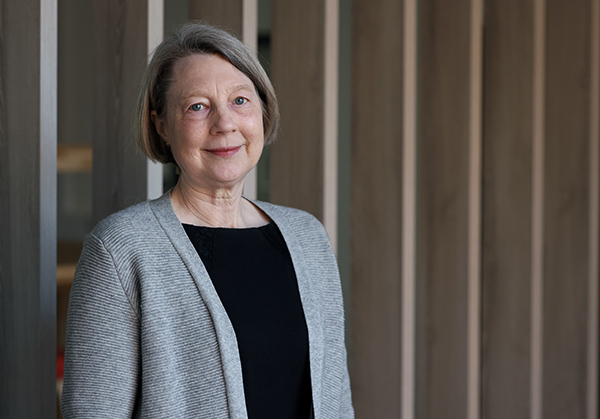This is Engineering Day 2022

On 2nd November 2022, The Royal Academy of Engineering is highlighting the impact and benefit of Engineering across the world, via the annual ‘This is Engineering’ day. The Academy has invited Engineers, Scientists, Researchers and Students across the UK to share their experiences within the field of Engineering, specifically focusing on this year’s theme of ‘improving lives through engineering'.
This is Engineering is a campaign to bring engineering to life for young people, and give more people the opportunity to pursue a career in the field. Their aim is to show more young people what engineering really looks like, and how it could be an exciting and rewarding path for them in the future.
For many, Engineering may seem limited to the design and production of machines, however Engineers in the University of Liverpool’s Faculty of Health and Life Sciences come from a broad range of disciplines and backgrounds. In the Institute of Life Course and Medical Sciences, Engineers work on research in Eye and Vision Science, AI, Musculoskeletal Biology, Cardiovascular Medicine, Dentistry and Veterinary Science, with the aim of improving the health of humans and animals.
To mark this year’s ‘This is Engineering’ Day, we have chosen to highlight some of the brilliant research carried out by our own researchers, asking how our own engineers, scientists, and mathematicians use engineering to improve lives.
We spoke to Professors Rachel Williams and Yalin Zheng and Dr Wahbi El-Bouri about their work:
Who are you?
Professor Rachel Williams, Professor of Ophthalmic Bioengineering
Could you briefly describe how you use engineering in your research to help improve lives?
My work focuses on the cornea, the clear window at the front of the eye, which can become damaged by disease or trauma leading to significant loss of vision. The cornea has a layered structure, making it possible to replace these layers, individually or completely, using a donated corneal transplant. There is, however, a shortage of donor corneas worldwide to treat all the patients who need one. My team have developed a material that can mimic the biological structure of the corneal layers. We can grow cells from donor corneas on thin membranes of this material which can be transplanted into a patient’s eye. Through this research we aim to be able to treat several patients from one donor cornea. Using our engineering knowledge, we are optimising the mechanical, physical and biological properties on this material. This procedure has the potential to allow far more people to be treated successfully and have their vision restored.
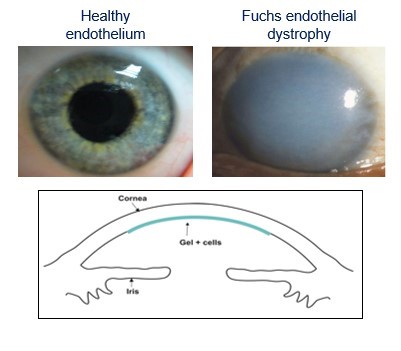
Corneal endothelial disease causes loss of vision. Corneal endothelial cells grown on a synthetic membrane and transplanted into the eye could mean one donor cornea could treat multiple recipients
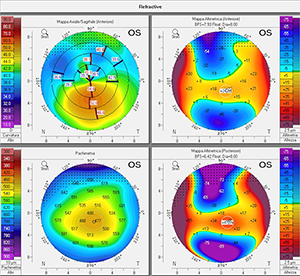
This figure are images of a patient with keratoconus, a disease that cause the cornea to become misshaped. In severe cases the patients may need a corneal transplant.
What do you think are the next big developments in engineering in relation to healthcare over the next 50 years?
We need to open our eyes to the alarming reality sight loss is having on people’s quality of life and the rocketing socio-economic costs both in the UK and globally. It is reported that every day 250 people in the UK begin to lose their sight and without new innovations in healthcare technologies an estimated 3.5 million people will be living with sight loss by 2050. We have the capability to use our expertise in engineering to develop these new diagnostics and therapies to determine the right intervention, designed for the specific patient and applied at the right time to make a difference to the progression of that specific patient’s disease.
How will those advancements in engineering have improved lives?
Finding new ways to overcome vision loss that are patient-focused and clinician-driven using our engineering expertise will improve the lives of millions of people while also saving money. Engineering can develop solutions for local populations as well as have a major role in addressing sight loss globally with a particular emphasis on those in less prosperous areas of the world.
How would you encourage a student to consider engineering as a degree or career?
I would explain how engineering knowledge can be used to address many of the major societal issues concerning our world right now. From my own experience I would show them how I have used my degree in engineering to address vision loss through the development of novel materials working in partnership with Ophthalmology clinicians in the UK and in India. I would also discuss with them how an engineering degree can open doors into careers that are rewarding in so many ways including improving the lives of everyone.
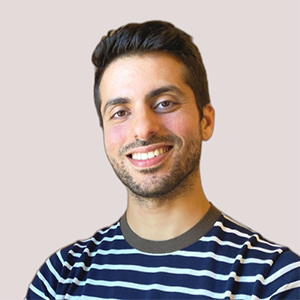
Who are you?
My name is Doctor Wahbi El-Bouri, and I'm a Tenure Track Fellow at the University of Liverpool.
Can you briefly describe how you use engineering in your research to help improve lives?
I use engineering in my research to help improve lives, mainly through computational modelling. So, what I do is develop computer models of the brain, the eye and the heart which we then use to simulate potential diseases and interventions to disease. We do this with the hope that in future when an individual comes to a clinic, we're able to simulate their disease within these models, and decide what the best treatment could be for that individual. And that's something we call personalized medicine.
What do you think are the next big developments in engineering in relation to healthcare over the next 50 years?
I think the next big developments in engineering and healthcare in the next 50 years will be the use of computational models to predict your life course. From birth and throughout your life, you'll have what we call a digital twin; a computer model that tracks you and your health over time and can provide accurate advice on interventions to ensure you are as healthy as possible as you age. These digital twins will be used to help doctors in deciding the best course of treatment for a patient, as well as personalise exercise prescriptions as well as medicine prescriptions to help doctors in deciding the best course of treatment for a patient.


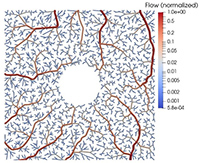
Image 1 and 2: Digital twin of blood flow in the entire brain, Bottom: Simulating a stroke vs a healthy brain
Image 3: A digital twin of the small vessels in the back of the eye (retina)
How will those advancements in engineering have improved lives?
I think engineering will have improved lives by making it easier for people to get treated in terms of drugs or medical devices that work for that individual. It will reduce the unnecessary use of drugs and pharmaceuticals, which costs the NHS a huge amount of money and are not always beneficial to our health. People will be able to live longer, healthier lives and when things go wrong their treatment will be personalized to them, be that drugs or exercise or medical devices. This will maximise the chances of a recovery and reduce unnecessary costs.
How would you encourage a student to consider engineering as a degree or career?
I would explain to them how I came to pursue a career in Engineering. When it came to choosing my degree in engineering, I was looking into further education in one of either Mathematics, Physics or Engineering. When considering these paths, I was told maths is the abstract development of ideas, Physics is taking that abstract and making it work in physical applications, and then engineering is taking the maths and the physics and applying them to the real world. With all this in mind, the satisfaction you get from research and working in Engineering, in building the products and applying them to the real world, is endless.
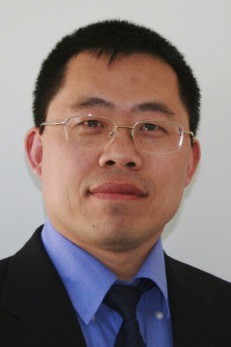
Who are you?
Yalin Zheng, Professor of AI in Healthcare. I am a computer scientist with over 20 years of experience in Medical Imaging, Artificial Intelligence and their applications in Healthcare.
Briefly describe how you use engineering in your research to help improve lives.
Over the past few years, I have been leading an interdisciplinary research team in developing new fundus cameras for imaging the eye with the aim of aiding the diagnosis and management of eye diseases. Supported by the National Institute for Health and Care Research (NIHR), we have designed an ultra-high resolution camera process called optical coherence tomography (OCT) which can take images of the cornea with unprecedented high resolution of 2 micrometres. This camera is now part of a clinical study to evaluate the device and understand the implications it has in treating eye disease. With the support of Engineering and Physical Sciences Research Council (EPSRC), we have also made low-cost portable version of OCTs specifically designed for screening of diabetic retinopathy in low and middle-income countries. This will allow many who would otherwise be unable to access such high-level treatment to get the care they need, aiding in reducing health inequality globally.
What do you think are the next big developments in engineering for healthcare in the next 50 years?
I believe that the advance of AI will profoundly transform healthcare engineering. In particularly, new smart wearable sensors such as smart watches / phones powered by AI will reshape the healthcare provision by enabling continuous monitoring, diagnosis and prediction of risks of diseases remotely w/o hospital visits.
How will engineering have improved lives?
Through AI, wearables, and other advancing technologies, engineering technologies will make our lives better, longer and healthier.
How would you encourage a student to consider engineering as a degree or career?
We need to make the engineering more understandable to students, engineering is not just science and maths but also creativity in order to solve real problems. As a community, we need to highlight the importance of engineering to students at a very young age. Showing them before they commit to any other career choices that Engineering offers them a platform to change the lives of others and build a career for themselves.
'This is Engineering' Day' is organised by the Royal Academy of Engineers. For more information on the day, the Academy, and it's engagement programmes, click here.
